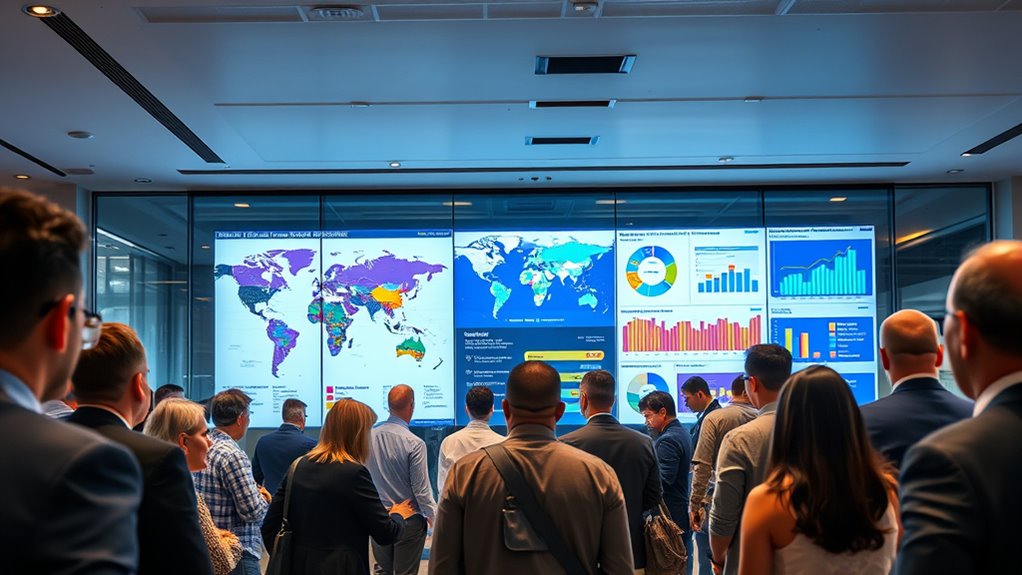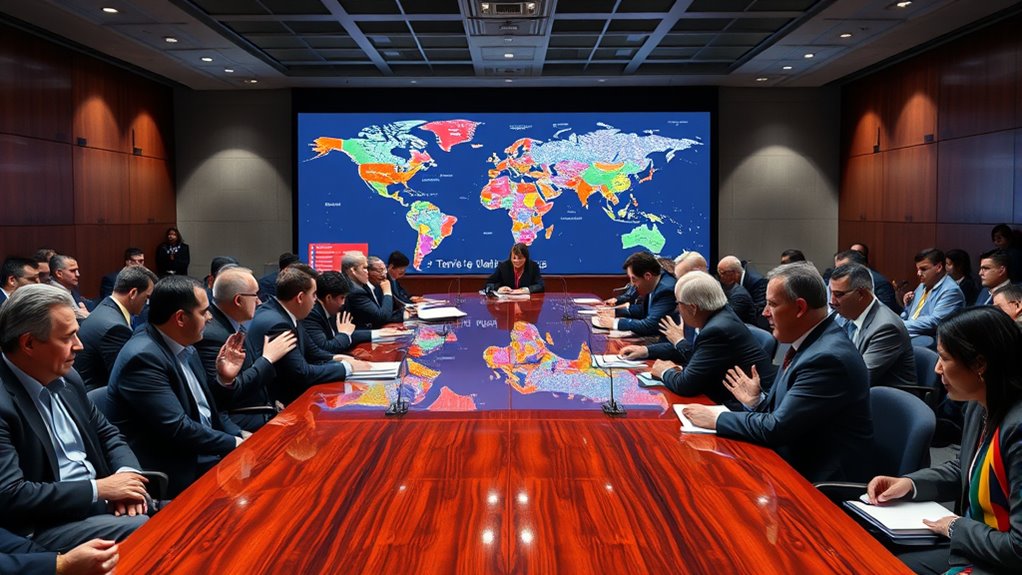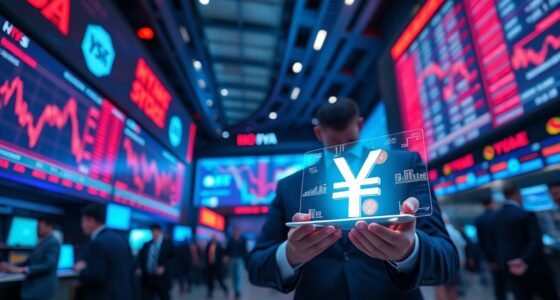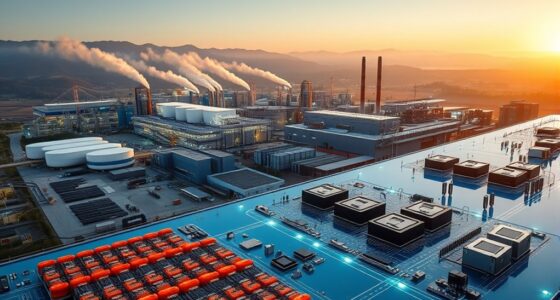Trade policies are evolving rapidly, with tariffs, standards, and new alliances shaping the global economy. You’ll notice countries forming blocs to reduce dependency and protect industries, while tariff negotiations can disrupt supply chains and affect prices. Rules around environmental and social standards also influence international trade flows. Understanding these shifts helps you grasp future market trends and strategic moves. Keep exploring to stay ahead in this dynamic trading landscape.
Key Takeaways
- Global supply chains are increasingly vulnerable to policy shifts like tariffs and trade restrictions.
- Tariff negotiations impact trade flow, costs, and sourcing decisions across industries.
- Countries are forming or strengthening trade blocs to mitigate risks and secure better economic terms.
- New trade rules and standards focus on environmental, labor, and safety compliance, affecting international commerce.
- Evolving trade policies require businesses to adapt proactively to changing tariffs, alliances, and regulations.

Have recent changes in global trade policies caught your attention? If they have, you’re not alone. Around the world, governments are reshaping how they approach trade, affecting everything from supply chains to international alliances. One of the most noticeable shifts involves global supply chains, which are the backbone of modern commerce. Companies rely on intricate networks that span multiple countries, moving goods quickly and efficiently. However, these chains are increasingly vulnerable to policy changes, especially tariffs and trade restrictions. As nations negotiate tariffs, they directly influence how goods flow across borders. Tariff negotiations, in particular, are making headlines because they can either facilitate smoother trade or create substantial hurdles. When countries impose tariffs, they raise the cost of importing and exporting goods, which can ripple through the supply chain, increasing prices and disrupting production schedules. If you’re involved in manufacturing or logistics, you probably feel the impact firsthand. Tariffs can delay shipments, raise costs, and force companies to rethink sourcing strategies. This economic tug-of-war reflects broader geopolitical tensions, as nations use tariffs as leverage during negotiations. The ongoing tariff discussions are often complex, involving multiple stakeholders with competing interests, making the outcome uncertain. These negotiations are essential because they determine whether trade barriers will rise or fall, shaping the landscape for global commerce in the coming years. You might notice that some countries are forming new trade blocs or strengthening existing ones, aiming to secure better terms and reduce dependence on unstable partners. These blocs are often created as strategic responses to shifting trade policies, designed to protect regional industries and foster economic cooperation. They serve as a buffer against unpredictable tariffs and trade restrictions, offering some stability amid global uncertainty. Additionally, the increasing focus on trade rules and standards aims to establish clearer guidelines and compliance measures that influence international trade agreements. For businesses and consumers alike, these developments mean staying alert to policy changes, as they can markedly impact prices, supply availability, and market access. Governments are also exploring new rules and standards that could tighten or loosen the flow of goods and services. These rules often include environmental, labor, and safety standards, which can influence international trade agreements. As a result, trade policy isn’t just about tariffs; it’s also about creating a framework that balances economic growth with social and environmental goals. For you, understanding these shifts means keeping an eye on diplomatic developments and being prepared to adapt your strategies accordingly. Whether you’re a business owner, investor, or consumer, the evolving trade landscape underscores the importance of flexibility and proactive planning. In the end, the global trade environment remains dynamic, shaped by tariff negotiations, shifting alliances, and new rules—making it essential for you to stay informed and ready for change.
Frequently Asked Questions
How Do Tariffs Impact Consumer Prices Globally?
When import tariffs increase, you’ll likely see consumer prices go up globally. Tariffs raise the costs for imported goods, which businesses often pass onto you through higher prices. This means you might pay more for products like electronics, clothing, or food. Even if tariffs target specific countries, their impact can ripple through supply chains, making everyday items more expensive worldwide. So, tariffs directly influence what you pay at the checkout.
What Are the Long-Term Effects of New Trade Blocs?
As new trade blocs form, you’ll notice long-term effects like increased trade diversification and deeper economic integration. These alliances encourage countries to expand markets and share resources, fostering stability. However, they can also lead to reduced global competition and potential trade tensions. Over time, you might see shifts in global power dynamics, with member countries benefiting from collective growth while non-members face challenges. Overall, these blocs reshape international trade landscapes markedly.
How Do Rules of Origin Influence International Trade Agreements?
Rules of origin influence your international trade agreements by setting origin criteria that determine where a product is made. These criteria guarantee that only goods meeting specific standards qualify for preferential treatment. You’ll need trade certification to prove a product’s origin, which helps prevent fraud and abuse. By clearly defining origin rules, trade agreements promote fair competition, facilitate customs procedures, and support economic integration among member countries.
What Mechanisms Exist to Resolve Trade Disputes?
You can resolve trade disputes through various mechanisms like dispute resolution and arbitration mechanisms. These processes allow you to settle disagreements efficiently, often without going to court. You might use international organizations such as the World Trade Organization (WTO) or bilateral arbitration panels to handle issues. These mechanisms help guarantee fair resolution, maintain trade relationships, and uphold trade agreements, making the process smoother and more predictable for all parties involved.
How Do Trade Policies Affect Emerging Markets’ Development?
Trade policies shape emerging markets’ development by influencing investment barriers and technology transfer. When policies promote open markets, you find more investment flowing in, boosting growth and innovation. Conversely, protectionist measures can erect barriers that limit access to capital and advanced technology. As a result, your economy may struggle with innovation, reduce competitiveness, and slow overall development. Effective trade policies, thus, are vital for fostering growth and technological progress in emerging markets.
Conclusion
As you navigate the shifting landscape of tariffs, rules, and new trade blocs, remember that while protectionism may seem like a shield, it often sparks tension rather than growth. Just as open markets foster collaboration, barriers can isolate and stifle innovation. In this evolving trade arena, your choices shape global connections—striking a balance between safeguarding interests and embracing cooperation will determine whether you build bridges or walls.









